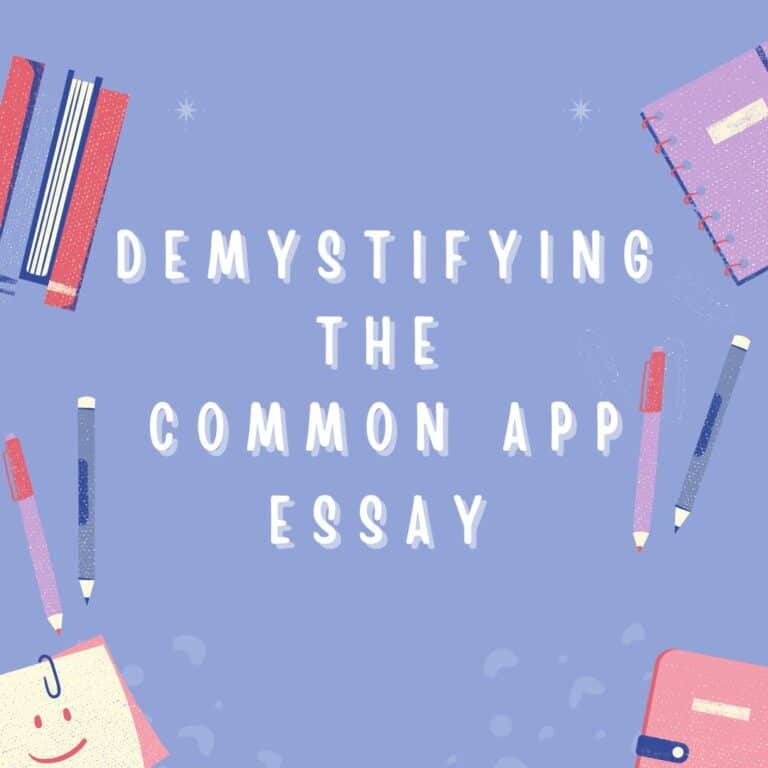
Clearly and concisely articulate who you are—in 650 words or fewer. This challenge would be daunting for many adults, yet this is precisely what the Common App personal statement section asks teenaged applicants to do. This main essay is submitted to the vast majority of colleges on a student’s list and therefore should omit mention of any particular school. Most students will write additional essays tailored to particular colleges, activities, or other topics, but the Common App essay is more broadly focused on the students themselves.
If capturing one’s essence in slightly more than a single-spaced page wasn’t daunting enough, many applicants find the exercise particularly challenging because they have little experience with this type of writing. Common App essays should be written in narrative form, essentially a story or stories in which the student is the protagonist. Through storytelling, students show the colleges who they are, rather than telling them.
Additionally, many high school students are accustomed to writing by choosing a prompt and then responding directly to it, ensuring that they hit all of the targets on a highly-specific rubric. While the Common App does allow students to choose among seven different prompts, selecting one is likely the least important decision a student will make in the entire college application process. The prompts are so broad that it would be virtually impossible to write an essay that doesn’t fit at least one of them—one prompt literally reads, “Share an essay on any topic of your choice.” We advise students to write the story they want to share and select a prompt at the time they’re submitting their applications. Often, several different prompts end up being appropriate for a single essay. The prompts aren’t wholly irrelevant, however; they’re a useful brainstorming tool that may “prompt” students to consider interests, experiences, obstacles, etc. that have shaped who they are.
Students often feel as though their essay has to be all-encompassing, capturing everything a college needs to know about them. It would be virtually impossible to cram every bit of evaluative information into a single narrative, which is why the essay is one piece of a much larger puzzle. Students will supply colleges with information about their academic and extracurricular achievements elsewhere in their applications. Therefore, the essay should not be a resume rehash, and using the space to highlight activities and awards is a missed opportunity to provide the colleges with information they don’t already possess.
The best essays are the ones in which the students’ personality and voice shine through their writing. In a way, the essay almost functions as a one-on-one interview, which most colleges unfortunately don’t have the resources to conduct. The essay is a chance for students to show the colleges how they think, what excites them, what they care about, their sense of humor, etc. Essentially, the essay should make the student “come alive” in the mind of the application reader, who ideally walks away with a sense of the student’s character and learns information about the student that is not provided elsewhere.
Students often express concerns that they are “ordinary” or “boring” because they haven’t experienced major hardship or an earth-shattering lived experience. While significant experiences, positive or negative, can make for good essay topics, some of the most engaging essays are about everyday moments—e.g., taking a shower, possessing an unusual laugh, playing canasta with grandma, wearing Crocs, eating Ramen noodles, etc. Many of these subjects are eminently relatable, and a less-common topic can help a student’s essay stand out in a sea of narratives about torn ACLs, service trips, and camp songs.
The primarily rubric-focused nature of high school writing often prompts students to design their essays around what they (or their parents) think the college wants to hear. Attempting to do so may put a student at risk of sounding performative, pretentious, or worse. What the college really wants to hear is the student’s authentic voice, undiluted by excessive editing by well-meaning parents, teachers, or siblings. The schools want to know who the students are, not what they’ve done. They want to know what students value, how they engage with the world around them, and what makes them different from their peers. They are interested in qualities like maturity, empathy, and insight, and they like to see growth. While the essay should obviously highlight positive qualities about the student, colleges do not expect applicants to be perfect. Attempting to portray a flawless image may come off as insincere whereas honest self-reflection can be extremely compelling.
College essays are arguably more important than ever, in light of the prevalence of test-optional and test-free policies: with fewer metrics, more attention is paid to the application materials that are submitted. Unlike so many other aspects of the college process, however, the quality of this critical piece of an application package is squarely within a student’s control. Rather than viewing this essay as a source of dread, students should view it as an opportunity. Every student has something special to offer, and the essay is the perfect way to show colleges what qualities make them unique and demonstrate the value they would bring to campus.
